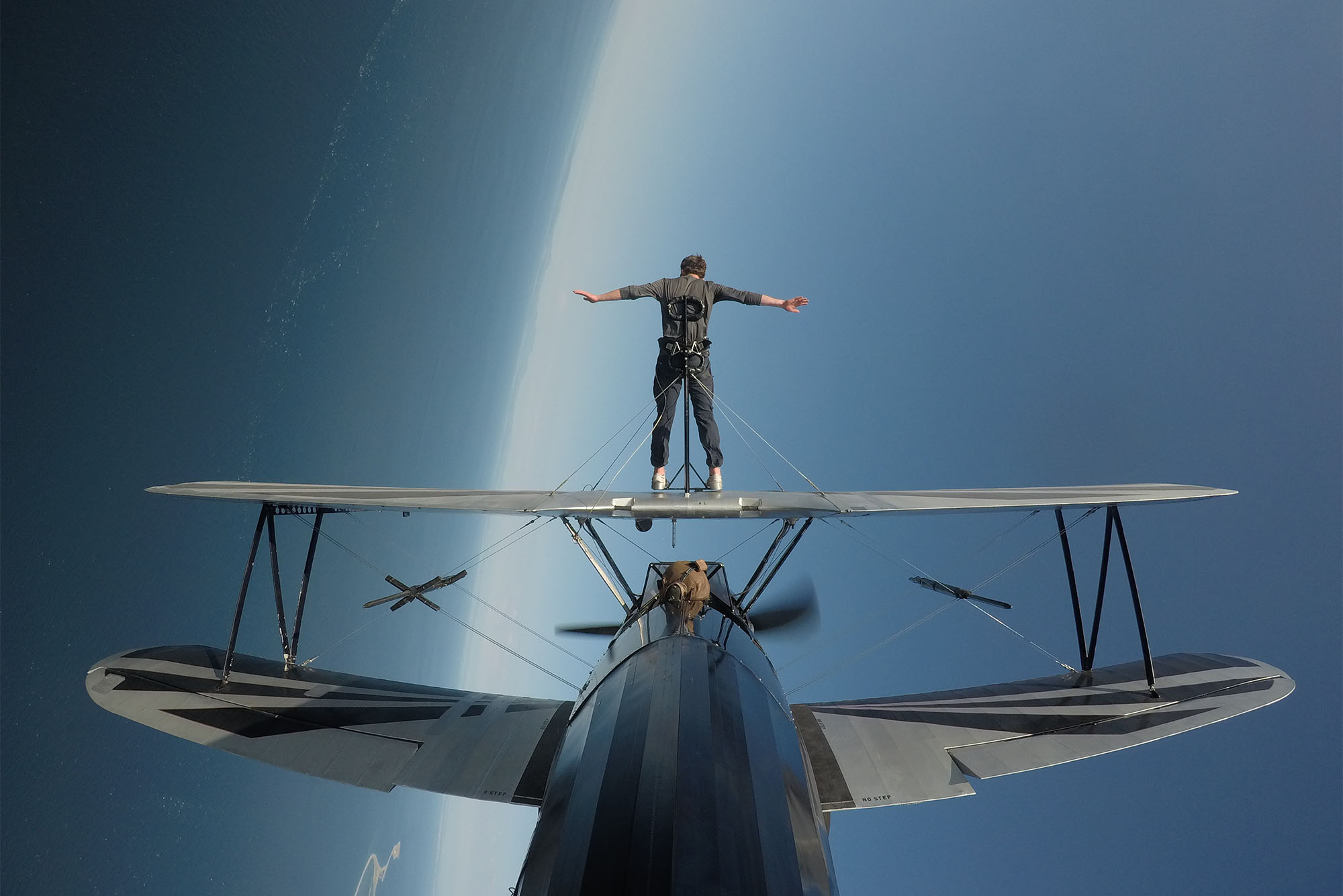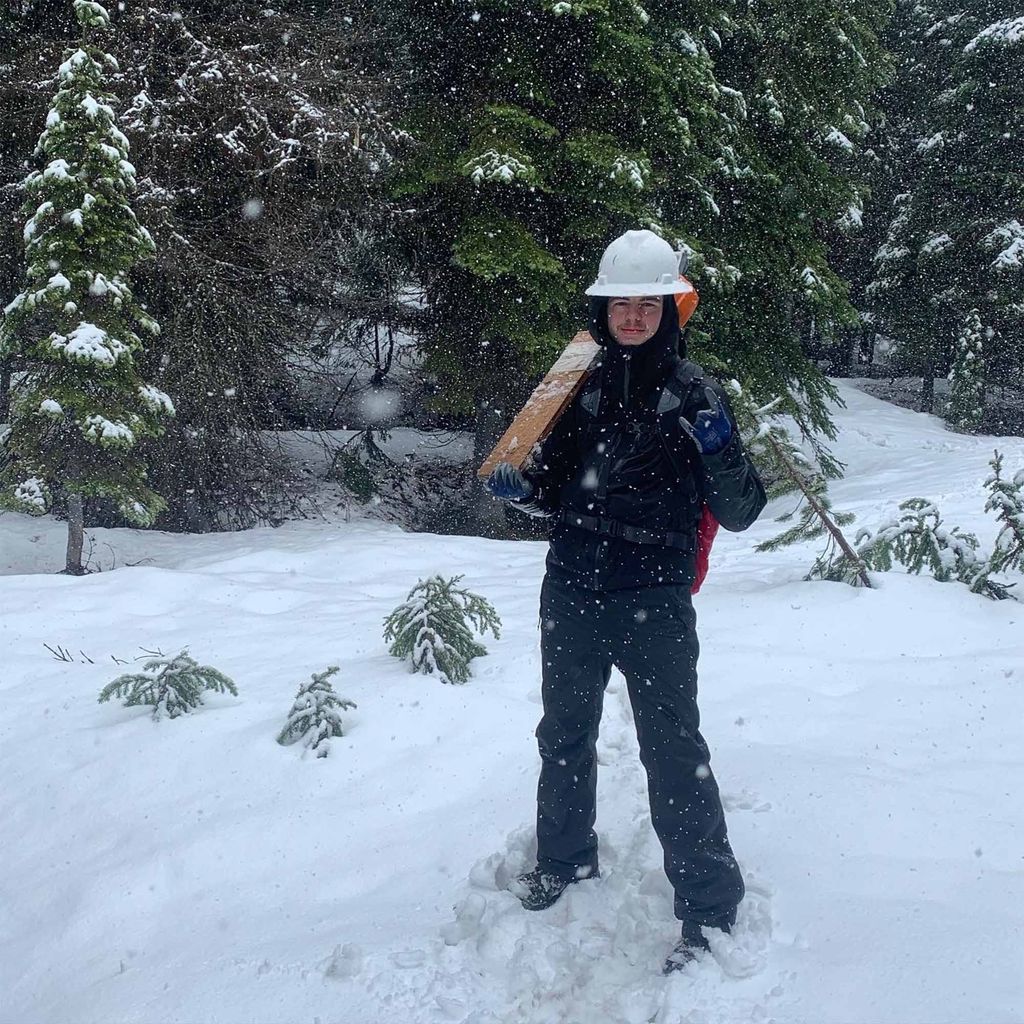Working the Pacific Northwest Trail

Working the Pacific Northwest Trail
“I truly feel like I can do anything,” Questrom student Ryan Loughran says after kitting out his car and heading west
Ryan Loughran wingwalking over Washington’s Olympic Peninusla. Wingwalking, which requires a full day of training, entails climbing from the cockpit of a biplane onto the wing rack.
It’s not quite “eat, pray, love”—for business administration student Ryan Loughran, who spent the summer working as a cleanup crew leader on a Pacific Northwest hiking trail, the mantra of his past few months was something more like “trail, lake shower, drive.”
Uh, lake shower? When you’re living out of your car—a 2005 Hyundai Sonata kitted out with a foam-and-plywood sleeping platform and window shields, to be specific—you shower where you can, explains Loughran (Questrom’24).
“I’ve only been bathing in lakes and stuff for months,” he says, laughing. “I just pop into the Columbia River with Dr. Bronner’s soap and it’s the best thing in the entire world.”
It’s exactly how the longtime hiker and generally outdoorsy kind of guy wanted to spend his summer. Initially, he planned on simply solo road-tripping out west, spending some time exploring the wilderness in Washington, Oregon, and Idaho. But he quickly realized that he wanted to do more with his summer break.

“A road trip would have been fun, but I realized that there was no purpose behind that other than indulging in travel,” Loughran says. “I started to wonder, what’s a way I can do a little bit of good by making some money for myself while giving back to the land I get to use?”
A Google search last fall led him to the Pacific Northwest Trail (PNT), a 1,200-mile, Congress-designated National Scenic Trail that runs east-west through Montana, Idaho, and Washington. It’s not to be confused with the Pacific Crest Trail (of Wild fame), a fellow National Scenic Trail stretching from California up to Washington. The PNTA, the association behind the PNT, was looking for seasonal crew members to maintain stretches of trail. Loughran applied as a crew lead. By March, the job was his.
He set out for eastern Washington at the end of May. Once he got to the PNT, he learned what his job would be: coleading a crew (comprising three core members and rotating volunteers) to log out, retread, de-brush, and perform general maintenance on stretches of trail.
Loughran and his crew worked eight days on and six days off. On their days on, they’d hike out to a section of the trail—if they were lucky, the Forest Service would arrange for horses to carry the equipment—and get to work clearing it. They camped at each site overnight. It was hard work—but that’s what Loughran liked about it.

“You really bond over digging a huge dirt pit to fill a turnpike and then cooking dinner together on a campfire stove,” he says. “Every day brought something new. We were off the grid so phones weren’t really a thing; being able to truly connect with all these different people and talk about intellectual things or just trade hiking stories was super fun to be a part of.”
And as for his days off? That’s where “drive” came into play. As soon as he finished logging work reports at the nearest library, Loughan was off. “I’d pull up AllTrails or Google maps and find someplace cool to drive to,” he explains. “An hour later, I’d be somewhere new and backpacking or rock climbing and just doing as much as I could.
“You only have a finite amount of time—you can rest when you’re old!”
Loughran’s adventuring took him all over the Pacific Northwest and up into Canada. Some highlights: biking around Washington’s San Juan Islands, paragliding in Revelstoke, British Columbia, exploring the Oregon wilderness, hiking the Canadian Rockies and the Enchantments region in the Cascade mountains, wing walking (moving along the wings of a plane during flight) in Sequim off the 101, and canoeing the Columbia River with some friends (well, until they were rescued by the utility company Seattle City Light—“it was supposed to be a chill river,” Loughran says).
Much of his freedom came from the fact that he was camping in his car. In most cases, he’d pull onto a National Forest road (where you can camp for free) and set up for the night. Camping in his car also allowed him to do some “stealth camping” in places like Seattle’s Pike Place Market.
Luckily, Loughran had only a few mishaps throughout the summer. A blown car fuse after plugging in a George Foreman grill resulted in a “super cold” ride to the nearest town to replace the fuse—and roll his windows back up. And, turns out, an AAA membership works in Canada, too: a fact he discovered after locking the keys in his trunk at the trailhead for Lake Louise and needing to call for service.

Wilderness area.
Together, all of his experiences—the good and the bad— “definitely made me feel more capable,” Loughran says. “I’ve gotten lost 30 miles into a hike and gotten out of the woods with only a compass; I’ve fixed my car on the side of the road; I’ve gone into bars in Canada not knowing anyone. After being by myself and pushing myself out of my comfort zone, I truly feel like I can do anything.”
Even his job was a gamble, he says, considering he’d never worked on a trail in his life. But succeeding as a trail lead proved especially valuable. “In a sense, it’s like: have the confidence to try anything, if you fail, you fail, and if you succeed, you succeed, and you hopefully learn and grow either way,” he says.
“Knowing that I’m trying my best and learning as I go is something I’ve been pretty proud of myself for this summer. Having the confidence to do my best at something—and be okay with failing—is definitely the biggest thing I’ve learned and will carry onto whatever I do next. This has been the best summer of my life.”
So what’s next? He plans to spend the coming year doubling down on his business classes and starting to think about how to combine all his interests into a career. Some ideas so far: economic policy or sustainable energy—“my grand vision is to one day work in a way that makes sustainable energy more accessible for everyday people,” Loughran says.
As for next summer: there’s always the trail.
Comments & Discussion
Boston University moderates comments to facilitate an informed, substantive, civil conversation. Abusive, profane, self-promotional, misleading, incoherent or off-topic comments will be rejected. Moderators are staffed during regular business hours (EST) and can only accept comments written in English. Statistics or facts must include a citation or a link to the citation.